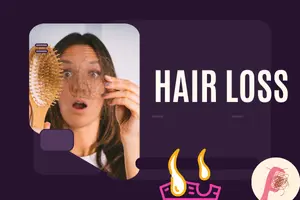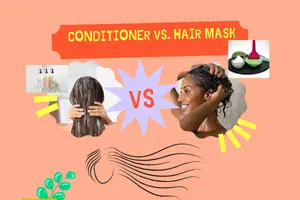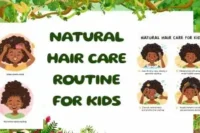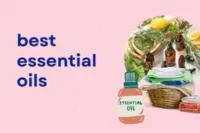Nutrition for Healthy Hair-Prevention Starts from the Inside
Published: 29 Oct 2024
Nutrition for Healthy Hair starts from within- it changed everything for me. I used to battle with brittle ends, dull strands, and slow growth, no matter what products I used. But once I focused on feeding my body the right nutrients, my hair began to transform, growing stronger, shinier, and more vibrant than ever. Imagine your hair flowing like a soft, radiant stream, full of life and health. That glow doesn’t come from styling alone. It begins with what’s on your plate. In this guide, I’ll share the essential nutrients that made a difference for me and how you can easily add them to your meals for lasting, healthy hair growth.
Protein: The Building Block of Hair Structure
Hair is made of keratin, a type of protein. That means your strands constantly need protein for hair repair, growth, and strength. A lack of protein in your diet weakens hair and causes breakage.
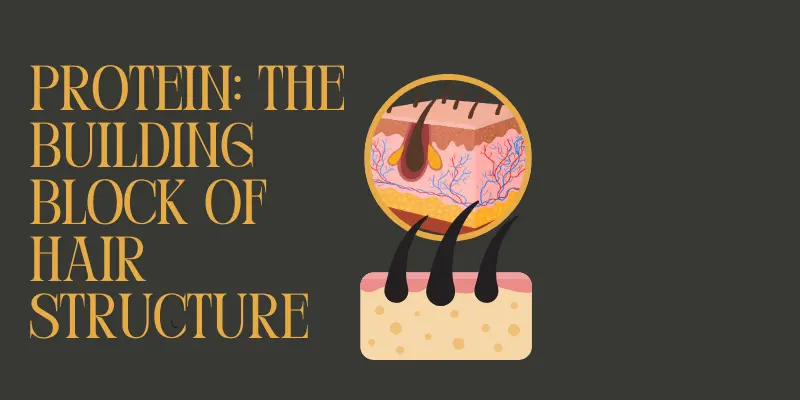
Sources: Eggs, lean meats, beans, tofu, and quinoa.
Tip: Start your day with a protein-packed breakfast. Try a smoothie made with Greek yogurt, chia seeds, and spinach.
Zinc: Your Hair Follicle’s Secret Defender
Zinc plays a vital role in tissue repair and strengthens hair follicles. Low zinc levels may lead to hair thinning, breakage, or early hair loss—issues often discussed in any effective Hair Loss Guide.
Sources: Pumpkin seeds, chickpeas, oysters.
Tip: Sprinkle pumpkin seeds on your salad or snack on roasted chickpeas to keep your zinc levels in check.
Omega-3 Fatty Acids: Natural Hydration from Within
Omega-3s keep your scalp and hair moisturized. They boost shine and reduce scalp inflammation, which encourages hair growth.
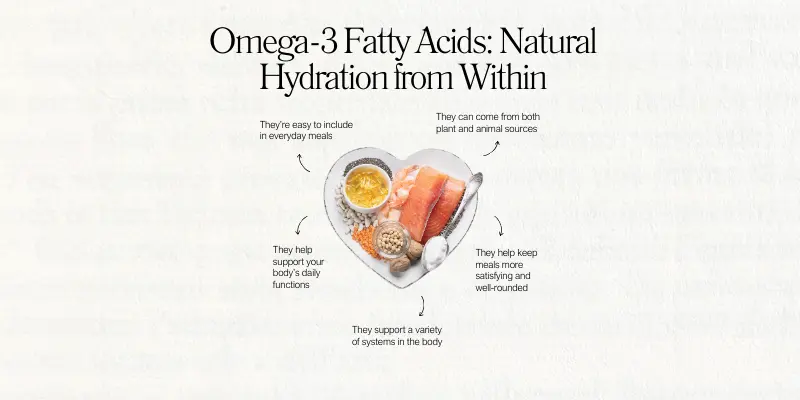
Sources: Salmon, mackerel, chia seeds, walnuts.
Tip: Eat fatty fish twice a week or add chia seeds to your smoothies or desserts.
How Omega-3s May Help Ease Mental Struggles
When I was going through a tough patch in college, I often felt overwhelmed by sadness, restlessness, and lethargy. It wasn’t until I came across some trusted health research that I realized how omega-3s could be more than just good fats. These fatty acids-especially eicosapentaenoic acid (EPA) and docosahexaenoic acid (DHA), are closely linked to brain health. Studies show that people who consume these nutrients regularly are less likely to experience depression or anxiety. These mental health conditions often involve panic, interest in life, and low energy. Including alpha-linolenic acid (ALA)-one of the three main omega-3s- through food or supplements may help ease symptoms and support overall emotional wellness.
From my experience and observations with clients and friends, EPA appears to be the most effective at boosting mood. These nutrients work by supporting the brain’s natural chemistry, helping stabilize mood swings, and promoting emotional balance. While all three types- ALA, EPA, and DHA– play essential roles, eicosapentaenoic acid truly stands out. You’ll find these healthy fats in fish oils, flaxseed, and even algae-based supplements. For me, committing to regular intake either through meals or quality capsules made a real difference. It wasn’t overnight, but the change in my mood was steady, noticeable, and reassuring.
Follow a Hair-Friendly Meal Plan and See the Difference
There are many ways to pamper your hair, but the best care starts with what’s on your plate. As you begin including these hair-boosting nutrients in your meals, you’ll notice the difference in healthier, denser, and shinier hair.
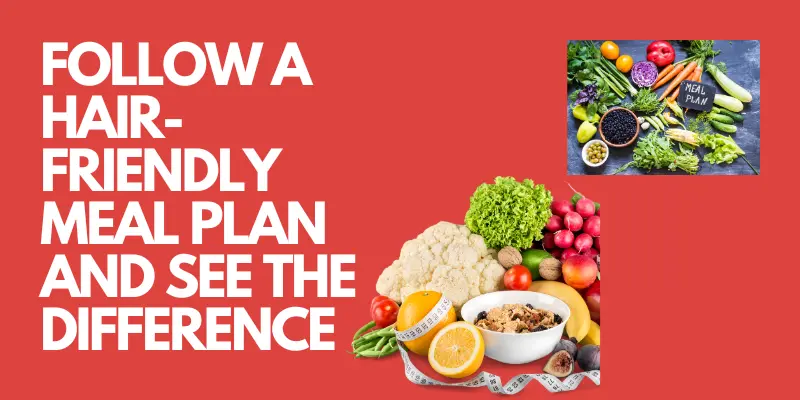
It’s never too late to invest in your hair. Healthy strands reflect a healthy body, and beauty does begin from within.
Conclusion: Feed Your Hair, Fuel Your Confidence
Your hair reflects your overall health. By focusing on Nutrition for Healthy Hair and giving your body the right mix of vitamins, minerals, and proteins, you promote stronger hair growth and a healthier scalp.
Just remember, hair health isn’t built overnight. It takes consistency, patience, and a well-balanced diet. Stick with it, and you’ll see long-lasting results not just in your hair but also in your confidence and overall well-being.
Frequently Asked Questions
Foods rich in protein, iron, zinc, and biotin play a key role in supporting strong and healthy hair growth. Eggs provide protein and biotin, spinach offers iron and folate, while salmon delivers omega-3 fatty acids that nourish the scalp. Nuts and seeds are also excellent sources of vitamin E and healthy fats. Together, these foods strengthen follicles and promote thicker, shinier hair.
A nutrient-rich diet can significantly improve hair strength and reduce shedding, but it may not be a cure-all. If hair loss is due to deficiencies in iron, vitamin D, or protein, a proper diet often reverses it. However, if the cause is genetic (androgenetic alopecia) or hormonal imbalances, dietary changes alone may not be enough. In such cases, medical treatments or lifestyle adjustments may also be required.
Hair grows at an average rate of about half an inch per month, so results take time. With consistent nutrition, you may notice subtle improvements in shine, softness, or reduced shedding after 8–12 weeks. For more noticeable changes like thickness or length, it usually takes 3–6 months. Patience is key, as hair health reflects long-term consistency.
Key vitamins for hair include biotin (B7) for keratin production, vitamin D for follicle activation, vitamin E for scalp circulation, and vitamin A for sebum production. Deficiencies in these vitamins can lead to thinning or breakage. Including a variety of fruits, vegetables, and healthy fats in your diet ensures you get these vital nutrients naturally.
Supplements can be useful when your diet falls short, but they should be taken cautiously. For example, biotin, iron, or vitamin D supplements may help if you’re deficient. However, taking too much—especially of vitamin A or selenium—can trigger hair loss. Always consult a doctor or nutritionist before adding supplements to avoid overdosing.
Yes, some foods can negatively impact hair health. Highly processed, sugary, and greasy foods increase inflammation and may weaken follicles over time. Excessive alcohol or caffeine can also dehydrate your scalp. Instead, focus on whole foods like fruits, vegetables, lean proteins, and healthy fats to nourish your hair from within.
Hydration is essential for strong and resilient hair. Drinking enough water keeps the scalp moisturized, reduces itchiness, and helps prevent breakage. Since hair shafts are made of about 25% water, dehydration can make them brittle. Aim for at least 7–8 glasses per day to support both hair and overall health.
Yes, hair loss caused by nutrient deficiencies is often temporary and reversible. For example, lacking iron, vitamin D, or protein can lead to excessive shedding, but correcting your diet can restore growth. Once the deficiency is addressed, expect improvement within a few months as your follicles recover.
Anti-inflammatory foods play an important role in scalp and follicle health. Omega-3-rich fish (like salmon or sardines), turmeric, leafy greens, ginger, and berries help reduce inflammation. By lowering scalp irritation and boosting blood circulation, these foods create an environment where hair can thrive.
Yes, even with a perfect diet, chronic stress can disrupt hormone balance and trigger conditions like telogen effluvium. Stress pushes hair follicles into a resting phase, leading to noticeable shedding weeks later. Managing stress through exercise, meditation, yoga, or breathing techniques is just as important as good nutrition for healthy hair.

- Be Respectful
- Stay Relevant
- Stay Positive
- True Feedback
- Encourage Discussion
- Avoid Spamming
- No Fake News
- Don't Copy-Paste
- No Personal Attacks

- Be Respectful
- Stay Relevant
- Stay Positive
- True Feedback
- Encourage Discussion
- Avoid Spamming
- No Fake News
- Don't Copy-Paste
- No Personal Attacks
